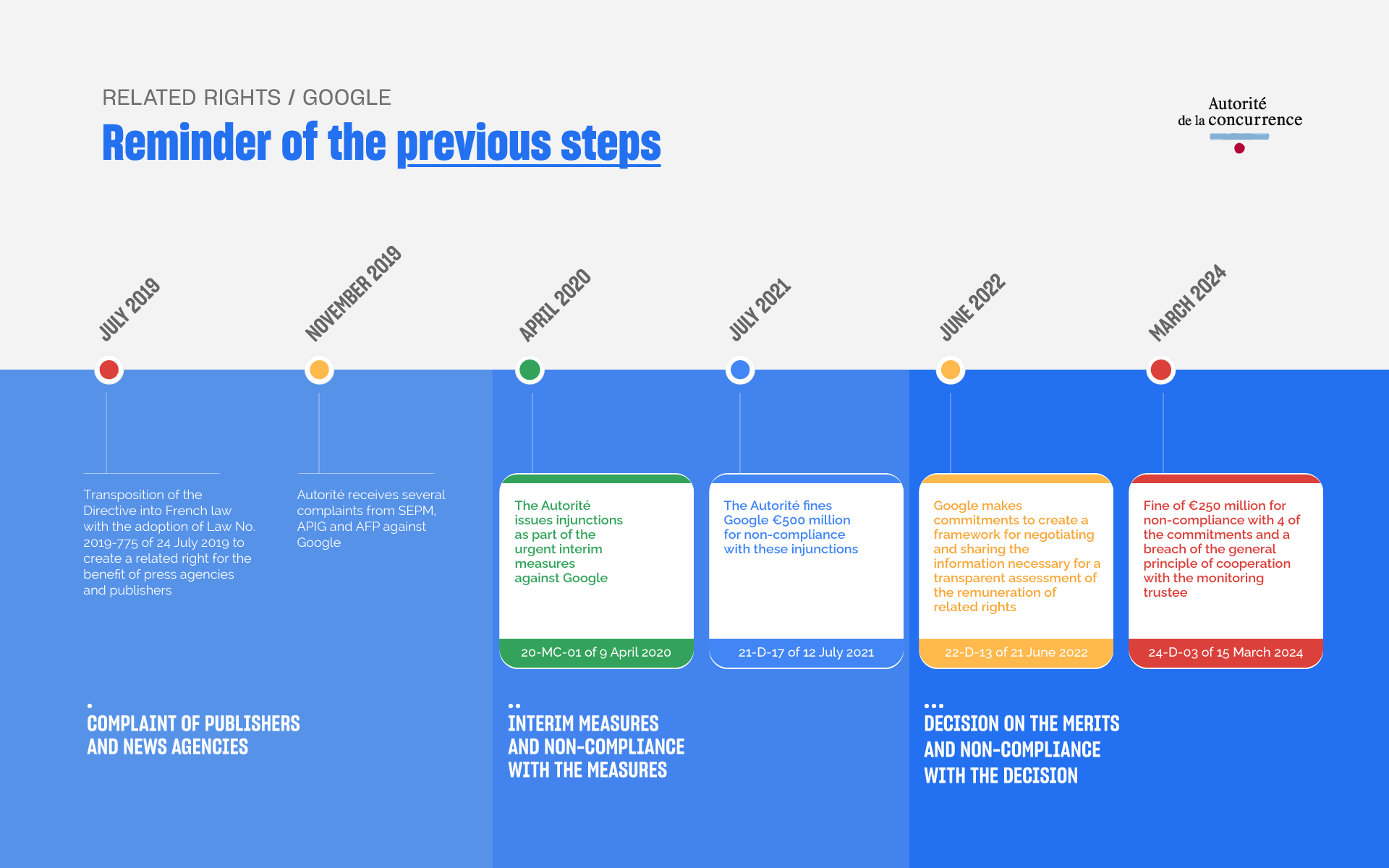Related rights: the Autorité fines Google €250 million for non-compliance with some of its commitments made in June 2022

Background
The Autorité de la concurrence has fined Alphabet Inc., Google LLC, Google Ireland Ltd and Google France (hereafter “Google”) €250 million for failing to comply with some of the commitments made binding by Decision 22-D-13 of 21 June 2022.
This is the fourth decision issued by the Autorité in this case in four years. These decisions come against the backdrop of the adoption of the French law of 24 July 2019 on related rights (transposing the EU directive on copyright and related rights of 17 April 2019), aiming to create the necessary conditions for balanced negotiations between press agencies, publishers and digital platforms. This legislative framework aimed to redefine, to the benefit of players in the press sector, the sharing of value between these players and to address the profound changes affecting the press sector for several years, in particular the growth of digital audiences, concomitant with the decline in print circulation, and the fact that a significant share of advertising value is now held by the major digital platforms.
After ordering interim measures in the form of injunctions in April 2020 (Decision 20-MC-01 of 9 April 2020/see press release), the Autorité found that Google had not complied with these injunctions and imposed a fine of €500 million, as well as ordering Google to comply, under penalty payment, with the initial injunctions (Decision 21-D-17 of 12 July 2021/see press release).
Subsequently, ruling on the merits of the case, in Decision 22-D-13 (see press release) of 21 June 2022, the Autorité accepted, for a period of five years, renewable once, the commitments proposed by Google to put an end to the competition concerns expressed. In this context, the Autorité approved the appointment of Accuracy as monitoring trustee to monitor and oversee the implementation of Google’s commitments.
In this latest decision, the Autorité has fined Google for breaching its commitment to cooperate with the monitoring trustee and failing to comply with four of its seven commitments, the aim of which was to guarantee the following principles:
- negotiate in good faith, based on transparent, objective and non-discriminatory criteria, within three months (Commitments 1 and 4);
- provide press agencies and publishers with the information needed to transparently assess their remuneration for related rights (Commitment 2);
- take the necessary measures to ensure that negotiations do not affect other economic relationships between Google and press agencies and publishers (Commitment 6).
With regard to “Bard”, the artificial intelligence service launched by Google in July 2023, the Autorité found in particular that Bard had used content from press agencies and publishers to train its foundation model, without notifying either them or the Autorité. Google subsequently linked the use by its artificial intelligence service of the content concerned to the display of protected content, by failing to propose a technical solution for press agencies and publishers to opt out of the use of their content by Bard without affecting the display of content protected by related rights on other Google services, thus obstructing the ability of press agencies and publishers to negotiate remuneration.
In view of these breaches, the Autorité has imposed a fine of €250 million on Alphabet Inc., Google LLC, Google Ireland Ltd and Google France. As Google undertook not to contest the facts, it was able to benefit from the settlement procedure. Google has also proposed a series of corrective measures to address certain breaches identified by the Autorité de la concurrence.

Reminder of the previous procedural steps
After ordering interim measures in April 2020, aimed at compelling Google to engage in good faith negotiations, in order to make a financial offer for the use of the protected content of press agencies and publishers, and adopting injunctions in this respect (20-MC-01), the Autorité found in July 2021 that Google had not complied with these injunctions (21-D-17 of 12 July 2021). Finding that Google had been able to frustrate negotiations with press agencies and publishers on the current use of protected press content on its services, the Autorité subsequently closed the analysis of the merits of the case and accepted, in June 2022 (22-D-13), the commitments made by Google to create a framework for negotiating and sharing the information necessary for a transparent assessment of the remuneration of related rights.
These commitments apply for a period of five years and are renewable once for an identical period on a reasoned decision of the Autorité.
The breaches identified by the Autorité
Cooperation with the monitoring trustee
The Autorité notes that Google failed to comply with its commitment to cooperate with the monitoring trustee, in particular by failing to share all the information necessary for the monitoring trustee to monitor the commitments. The Autorité also notes that Google tried to delay the timing of when the Autorité would be informed in the event that the monitoring trustee had any doubt about a potential breach.
Good faith negotiation of remuneration based on transparent, objective and non-discriminatory criteria
With regard to transparency, the Autorité first notes that Google did not comply with the commitment made to the monitoring trustee to send its methodology note to the negotiating parties at the same time as the remuneration offer, as several parties had access to this note after negotiating with Google. The Autorité also finds that the methodology note is particularly opaque (opacity surrounding the percentages used to determine the “attributable” amounts of revenues allocated by Google, reference periods that are not aligned with the periods used by Google in its remuneration offers, etc.).
The Autorité also notes that the objectivity criterion was not met, since Google does not mention, in its methodology note, all the services that could generate revenues for the negotiating party, some of which are not even taken into account or justified (redirection to YouTube from protected content).
Lastly, the Autorité notes that the non-discrimination criterion was also not met, insofar as the methodology developed by Google leads to press publishers in different situations being treated identically. According to the Autorité, not taking into account differences in attractiveness between content does not allow for an accurate reflection of the contribution of each press agency and publisher to Google’s revenues. In addition, the Autorité notes that Google introduced the concept of a “minimum threshold” for remuneration, below which it would not remunerate publications. This choice, in its very principle, introduces discrimination between publishers that, below a certain threshold, are all arbitrarily assigned zero remuneration, regardless of their respective situations.
With regard to indirect revenues, the Autorité finds that the “lump sum” proposed by Google in the various versions of its methodology note was not consistent with its previous decisions or the ruling of the Paris Court of Appeal of 8 October 2020. The Autorité notes, in this regard, that Google limited indirect revenues to a marginal share in the calculation of its financial offers, while the aforementioned decisions found that indirect revenues represented the biggest share of revenues derived from the display of protected content on its services.
The Autorité also notes that Google gave no contractual expression to the commitment to update and, where appropriate, regularise remuneration in the majority of the contracts signed with publishers since the commitments came into force, or has done so only in part.
- Google failed to comply with Commitment 1, which required it to negotiate in good faith based on transparent, objective and non-discriminatory criteria.
- With regard to indirect revenues, the “lump sum” proposed by Google does not appear to be consistent with the decisions previously issued in this case, with which Google undertook to comply.
- By failing to comply with Commitment 1, Google breached Commitment 4, which required it to make a remuneration offer “in accordance with the conditions provided for in the First Commitment”, within three months of receipt of the Complete Negotiation Request.
Incomplete information provided by Google, not covering all the revenues derived from the use of protected content, in particular indirect revenues
While the commitments mechanism is based on the need for consistency between the information provided and the remuneration offers made by Google, the Autorité found no link between the documents forming the basis of the negotiations and the remuneration offers.
There is no link between the methodology note, the Data Report and the explanatory appendix, for any of the calculation components. In addition, the Autorité found during its investigation that Google was unable to submit a Data Report for the press publishers’ sub-domains, within the timeframe set out in its commitments.
In addition, the Autorité notes that Google severely limited the communication of data on the revenues generated by queries triggered by the display of protected content, even though such data would appear useful for assessing indirect revenues.
- The information provided by Google does not enable the parties to transparently assess their remuneration. Google has therefore breached Commitment 2.
The question of related rights in the development of artificial intelligence tools
In July 2023, Google launched a new artificial intelligence service in France called “Bard” (renamed “Gemini” since 8 February 2024), a chatbot that can answer user questions.
The Autorité found during its investigation that Google used content from the domains of press publishers and news agencies when training the foundation model of its artificial intelligence service and for the grounding (the sending of a query by the artificial intelligence service to Google Search, in order to provide an answer to the question posed by the user) and display (the displaying of the answer to the user) stages, without either the press agencies and publishers or the Autorité being informed of these uses.
The question of whether the use of press publications as part of an artificial intelligence service qualifies for protection under related rights regulations has not yet been settled. At the very least, the Autorité considers that Google breached Commitment 1 by failing to inform publishers of the use of their content for their Bard software.
Furthermore, Google did not propose, at least until 28 September 2023 and the launch of its tool “Google Extended”, a technical solution for press agencies and publishers to object to the use of their content by Bard without affecting the display of this content on other Google services. Until this date, press agencies and publishers wanting to opt out of this use had to insert an instruction opposing any crawling of their content by Google, including on the Search, Discover and Google News services, which were the subject of negotiation for the remuneration of related rights. In the future, the Autorité will be particularly attentive as regards the effectiveness of opt-out systems implemented by Google.
- The Autorité considers the fact that Google did not inform editors and press agencies of the use of their content by its service Bard to be a breach of its obligation of transparency under Commitment 1.
- Google breached Commitment 6 by linking the use of press agencies’ and publishers’ content by its artificial intelligence service to the display of protected content on services such as Search, Discover and News.
The Autorité has imposed a fine of €250 million
Google did not contest the alleged practices and requested the benefit of the settlement procedure, under which a company that does not contest the facts can obtain a financial penalty within a range proposed by the General Rapporteur, setting the maximum and minimum amounts of the fine that may be imposed by the Board. In the context of the negotiated procedure, the Autorité has imposed a total fine of €250 million on Alphabet Inc., Google LLC, Google Ireland Ltd and Google France.
Google has also presented a series of corrective measures designed to address the breaches identified, of which the Autorité takes note.
Decision 24-D-03 of 15 March 2024
Corrective measures
Contact(s)

